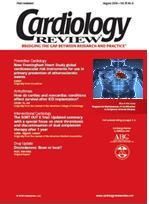Publication
Article
Cardiology Review® Online
One size doesn't fit all in medicine
Author(s):
One size doesn't fit all, yet we often approach medicine as if it does.
The New York Times
Wall Street Journal
One size doesn't fit all, yet we often approach medicine as if it does. The study reported by Shoemaker and Angiolillo dealing with the response of patients with type 2 diabetes to standard and double doses of clopidogrel (Plavix) for platelet inhibition is instructive, clinically practical, and important in an era when a stent thrombosis rate of 0.5% reported in and can cause widespread fear among both patients and cardiologists.
In this study from the University of Florida, 64 patients between 25 and 80 years of age met the criteria for medically treated type 2 diabetes and known coronary artery disease and were in a steady-state phase (> 1 month) of standard treatment (75 mg/day) of clopidogrel. All patients were also treated with low-dose aspirin (81 mg/day).
The effect of the antiplatelet drugs was measured primarily by aggregation (Aggmax). Of the 64 patients, 40 were treated suboptimally (Aggmax > 50%). These 40 patients were randomly assigned to receive either a double dose (150 mg) or a standard dose (75 mg) of clopidogrel. After 30 days, they were retested. The standard-dose group all remained at suboptimal response levels, whereas 8 of the 20 patients (40%) in the double-dose group showed improvement to optimal platelet inhibition response. However, once they were returned to the standard dose for another 30 days, all 8 went back to a suboptimal response, showing the dependence of these patients on a larger dose. Of note and clinically relevant, 60% of the suboptimal responders remained suboptimal despite the double dose of clopidogrel.
This is the first study to demonstrate the association between type 2 diabetes and non-responders to platelet inhibition with clopidogrel and the dose dependency of some of these nonresponders. It certainly raises several unanswered questions. Should all patients with diabetes who undergo stenting be routinely tested for platelet inhibition? Should we routinely double dose stented patients with diabetes? Will the nonresponders respond to even higher doses after a double dose? For instance, some centers load their patients with as much as 900 mg at the time of the procedure. Should high loading doses be routine to try to convert all potential nonresponders to responders?
Platelet inhibition during and after stent deployment is paramount to avoiding stent thrombosis in the immediate period following placement and over the ensuing weeks and months. This study also raises the question of how uniform the platelet reaction is to aspirin and various aspirin doses. Because we are so compulsive about measuring the activated clotting time during the procedure, shouldn't we routinely measure platelet activity at certain time points to determine that we have effectively controlled platelet activity? This study is an important reminder not to be complacent with drug therapy or assume that standard dosing is effective in all patients.






